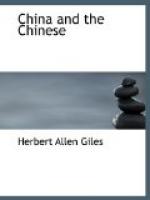Chuang Tzu, a philosopher of the fourth century B.C., devoted himself to elucidating and illuminating the teaching of Lao Tzu. His work, which has survived to the present day, will shortly occupy our attention. For the moment it is only necessary to say that it contains many of the Master’s traditional sayings, but never once mentions a treatise.
In the third century B.C. there lived another famous Taoist writer, Han Fei Tzu, who devotes the best part of two whole sections of his work to explaining and illustrating the sayings of Lao Tzu. Yet he never mentions the treatise. He deals with many sayings of Lao Tzu now to be found in the treatise, but he does not take them in the order in which they now stand, and he introduces several others which do not occur at all in the treatise, having apparently been overlooked by the compiler.
In the second century B.C. there lived another famous Taoist writer, Huai-nan Tzu, who devotes a long chapter to illustrating the doctrines of Lao Tzu. He never mentions a book.
One hundred years B.C. comes the historian Ssu-ma Ch’ien, whose brilliant work, the first of the Dynastic Histories, I have already had occasion to bring to your notice. In his brief memoir of Lao Tzu, he does mention a book in five thousand and more characters; but he mentions it in such a way as to make it clear beyond all doubt that he himself could never have seen it; and moreover, in addition to the fact that no date is given, either of the birth or death of Lao Tzu, the account is so tinged with the supernatural as to raise a strong suspicion that some part of it did not really come from the pen of the great historian.
About two hundred years later appeared the first Chinese dictionary, already alluded to in a previous lecture. This work was intended as a collection of all the written characters known at date of publication; and we can well imagine that, with Lao Tzu’s short treatise before him, there would be no difficulty in including all the words found therein. Such, however, is not the case. There are many characters in the treatise which are not to be found in the dictionary, and in one particular instance the omission is very remarkable.
Much other internal evidence against the genuineness of this work might here be adduced. I will content myself with a single, and a ludicrous, item, which shows how carelessly it was pieced together.
Sentences occur in the Tao-Te-Ching which positively contain, in addition to some actual words by Lao Tzu, words from a commentator’s explanation, which have been mistaken by the forger for a part of Lao Tzu’s own utterance.
Add to this the striking fact that the great mass of Chinese critical scholarship is entirely adverse to the claims put forward on behalf of the treatise,—a man who believes in it as the genuine work of Lao Tzu being generally regarded among educated Chinese as an amiable crank, much as many people now regard any one who credits the plays of Shakespeare to Lord Bacon,—and I think we may safely dismiss the question without further ado.




